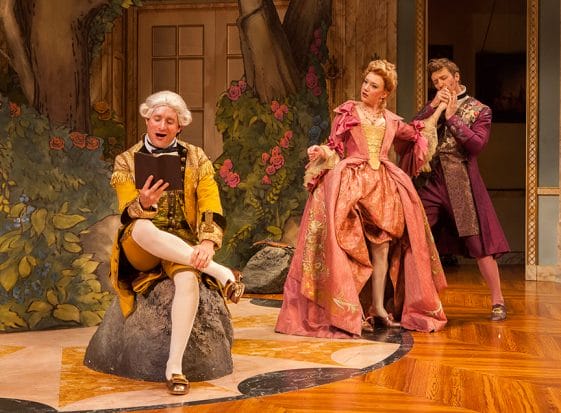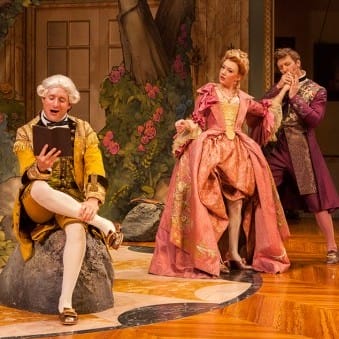
It Probably Seemed Like A Good Idea At The Time: “Metromaniacs”
By Rebecca Romani
There is a moment in Sophia Coppola’s anachronistic and wildly historically inaccurate film, “Marie Antoinette,” when one just gives up, gives in and thinks, “OK. Bow Wow Wow. Sure. Why not…”
That moment is long in coming in the Old Globe production of ‘The Metromaniacs,” the new farce by David Ives (“Venus in Furs,” ‘All In the Timing”) which kicks off The Old Globe’s new season.
Known for incubating productions with legs and often, teeth (think “Allegiance”), the Old Globe seems to be off to a light and loquacious start. “The Metromaniacs” (meaning person addicted to poetry or writing verse) is mostly logorrhea and fluff- rapid, rhymed dialog signifying “rien.” Pretty to look at, visually dynamic, “Metromaniacs” is a French farce with almost none of the “farci” which gives the best of the genre its bite.
Ives has made a name for himself recently, adapting various pieces for modern theatre. This time he has turned to “La Metromanie,” an 18th century French comedy by Alexis Piron, who wrote for La Comédie-Française and gave Voltaire a run for his money where witty repartee was concerned.
In both works, poetry and love hold sway. Francalou (played with joyous bombast by Adam LeFevre), a doting father, Parisian gentleman, and ardent secret poet, has set up a soiree to which he has invited a number of young men who just might be able to pull his daughter Lucille (a take on an escapee from a mall in Beverley Hills by Amelia Pedlow) out of her mania for poetry long enough to marry one of them. Francalou has written a light comedy with starring roles for his guests. Word gets out and swains abound, including one Damis (a suitably foppish turn by Christian Conn), a rising poet and playwright, and his good friend Dorante (earnestness personified by Cary Donaldson). Lucille’s maid, Lisette (an appropriately saucy Dina Thomas), tries in vain to help her mistress be matched, but things become complicated when maid is taken for mistress, mistress for maid and lovers, including the energetic valet, Mondor (solid work by Michael Goldstrom), mistakenly seek outside their station.
Add to that, the small but interesting side plot that Francalou has taken to penning poetry as a poetess from Brittany whose prose has caught Damis’ fancy, and you have the makings of a merry round of mistaken identity, mismatches and mayhem. Dorante ruins Damis’ play as payback for stealing “his” love and Lisette plays Lucille a little too well. Eventually all is righted, and Lucille gets the man she needs, Lisette finds her match, and Damis…well, life’s a harmattan, it’s 2016, after all, and Damis eventually gets his…um, man.
Director Michael Kahn keeps the whole, madcap plot moving along at a good clip and Murell Horton’s costumes are a stunning combination of attention to detail and color schemes. James Noone lays out a beautiful if rather static set. The only issue is that the set within the set is a tad pedestrian for a show set up in a chateau.
Piron, known for his spirited rhymes, based his play on Voltaires’ famous infatuation with a poetess from Brittany who turned out to be the creation of a male poet whose own works had been spurned by publishers. Voltaire took the deception in good humor, but was less than amused when the well-known playwright filled the house with his delicious satire of the great philosopher’s poetic mis-dalliance.
Unfortunately, Ives seems to have fastened onto the play’s Commedia dell’arte roots and little of its wordplay. His verse is facile, tending towards the anachronistic and dumbed down. There are moments when Ives reaches a bit far (“Crazy for subways?” “No! Crazy for verse!”), and others not far enough (“twain,” “bwain.”). Lucille’s “whatevers” are grating by the middle act, and even his characters’ names (“Bouillabaisse,” “Peauduncqville”) pander to an easily amused audience. Everyone seems to be in awe that the work rhymes– as if every song ever on the top 40 charts doesn’t.
The play redeems itself somewhat with a surprisingly witty and articulate final speech, but Ives seems to have chosen to ignore Piron’s ending in which Damis gets his play, not his poet, and art overcomes all.
“Metromaniacs,” with its uniformly excellent cast, is a light finish to a long day, but if you are looking for fine French farce, this be lesser fare.
TICKETS: http://www.theoldglobe.org/tickets/production.aspx?PID=11829



